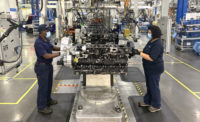Based in Gütersloh, Germany, the Miele Group is one of the world’s leading manufacturers of commercial and residential appliances. However, it didn’t start out that way. Founded in 1899 by Carl Miele and Reinhard Zinkann, the company initially made cream separators for the dairy industry. Over the years, the company has manufactured butter churns, hand carts, bicycles and even automobiles.
Today, the company is still family-owned and operated, but its focus is strictly on appliances: stoves, ovens, range hoods, refrigerators, freezers, dishwashers, washing machines, dryers, vacuum cleaners and coffee makers. The company also makes machines for cleaning and sterilizing medical instruments and laboratory equipment.
During its 2016-17 fiscal year, which ended June 30, 2017, Miele tallied sales of more than $4.6 billion, a 5.9 percent increase from the previous year. Miele operates 11 manufacturing facilities throughout Europe and one in China. It employs 19,465 people worldwide, more than half of which are in Germany.
Miele’s products, in particular its washing machines, are known for their durability. The company tests its appliances for a service life of 20 years, so the motors, belts and other components used in them must meet high standards. The company’s reliability testing program includes humidity and salt spray tests, so preventing corrosion is a top priority.
Protecting Contacts With Adhesives
Miele uses a dual-curing adhesive to seal and protect the electrical contacts on its washing machine motors. The purpose of sealing crimped contacts is to prevent contact corrosion of the aluminum-copper assembly. This is particularly important if washing machines will be used in high-humidity environments.
Crimped connections are mainly used in large-scale production, where single wires must be assembled. Crimping is fast and a good alternative to soldering. It can create a strong, reliable connection between a conductor and connecting element. With the right tools, cable and plug wires can be connected in a form-closed manner.
Miele seals crimped contacts with a one-component acrylate, Dualbond AD4950 from DELO Industrial Adhesives. This adhesive offers high elongation at tear, and is able to equalize tensions, which is important for this type of application. The adhesive also resists aging for long-term stability.
When validating the adhesive, Miele ran different tests to ensure that both the sealing and corrosion protection were high quality. Simulating the lifetime of the adhesive bond, the components were sprayed with salt solution and exposed to different temperatures and humidity conditions for a given period of time.
When cured, the product can be used at temperatures ranging from -40 to 120 C. It also offers a dual-curing mechanism based on light and humidity. This means that after short exposure to UV radiation, no additional processing step is needed for final curing of the adhesive.
In shadowed areas, the ambient air humidity is sufficient for curing. This curing system is typically used for applications where the adhesive is transported by capillary forces into small shadowed areas and ensures that the liquid adhesive is fully cured in the final product.
In its assembly line, Miele uses a screw dispenser for fully automatic dispensing of the adhesive. Every step of the process is monitored by a camera system. This allows for control of the dispensing operation and detection of any bubble formations. In the subsequent curing step, the adhesive is shortly exposed to high-intensity UV light from an LED spot lamp. This lamp is the ideal for curing of very small adhesive drops or bonding areas within seconds.
Miele has successfully used this adhesive since 2013.
For more information on UV-curing adhesives, call DELO at 978-254-5275 or visit www.delo-adhesives.com/us.









